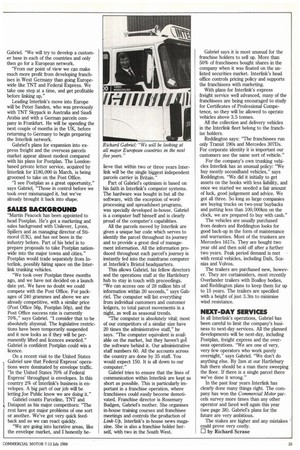IHIII11 1 11.11 lieve that within two or three years Interlink will be the single biggest independent parcels carrier in Britain."
Page 29

If you've noticed an error in this article please click here to report it so we can fix it.
Part of Gabriel's optimism is based on his faith in Interlink's computer systems. The hardware was bought in but all the software, with the exception of wordprocessing and spreadsheet programs, was specially developed in-house. Gabriel is a computer buff himself and is clearly proud of the computer's capabilities.
All the parcels moved by Interlink are given a unique bar code which serves to identify the parcel throughout its journey and to provide a great deal of management information. All the information produced throughout each parcel's journey is instantly fed into the mainframe computer at Interlink's Bristol headquarters.
This allows Gabriel, his fellow directors and the operations staff at the Hartlebury hub to stay in touch with proceedings. "We can access one of 28 million bits of information within 20 seconds," says Gabriel. The computer will list everything from individual customers and customer ledgers, to total parcel movements in a night, as well as seasonal trends.
"The computer is absolutely vital; most of our competitors of a similar size have 20 times the administrative staff," he says. "The computer equivalent is available on the market, but they haven't gol the software behind it. Our administrative staff numbers 60. All the accounts across the country are done by 35 staff. You would expect 150. It is all down to our computer."
Gabriel tries to ensure that the lines of communication within Interlink are kept as short as possible. This is particularly important in a franchise operation, where franchisees could easily become demotivated. Franchise director is Rosemary Budgen, Gabriel's mother. She organises in-house training courses and franchisee meetings and controls the production of Link-up, Interlink's in-house news magazine. She is also a franchise holder herself, with two in the South West. Gabriel says it is most unusual for the franchise holders to sell up. More than 50% of franchisees bought shares in the company when it was floated on the unlisted securities market. Interlink's head office controls pricing policy and supports the franchisees with marketing.
With plans for Interlink's express freight service well advanced, many of the franchisees are being encouraged to study for Certificates of Professional Competence, so they will be allowed to operate vehicles above 3.5 tonnes.
All the collection and delivery vehicles in the Interlink fleet belong to the franchise holders.
Reddington says: "The franchisees run only Transit 190s and Mercedes 307Ds. For corporate identity it is important our customers see the same sort of vehicle."
For the company's own trunking vehicles Interlink has an unusual policy: "We buy mostly secondhand vehicles," says Reddington. "We did it initially to get assets on the books with less liability, and once we started we needed a fair amount of luck, good judgement and advice. We got all three. So long as large companies are buying trucks on two-year buybacks and putting less than 100,0001an on the clock, we are prepared to buy with cash."
The vehicles are usually purchased from dealers and Reddington looks for good back-up in the form of maintenance and warranties. Most of the trunkers are Mercedes 1617s. They are bought two year old and then sold off after a further two years. Peak period demand is met with rental vehicles, including Dafs, Scanias and Volvos.
The trailers are purchased new, however. They are curtainsiders, most recently Overlander trailers with Boalloy bodies, and Reddington plans to keep them for up to 15 years. The trailers are specified with a height of just 3.3m to minimise wind resistance.
NEXT-DAY SERVICES
In all Interlink's operations, Gabriel has been careful to limit the company's business to next-day services. Al] the planned developments will be next-day, including Postplan, freight express and the overseas operations. "We are one of very, very few operators who work purely overnight," says Gabriel. "We don't do anything else. By 2am at our Hartlebury hub there should be a man there sweeping the floor. If there is a single parcel there we've done it wrong."
In the past four years Interlink has clearly done many things right. The company has won the Commercial Motor parcels survey more times than any other operator and fared well again this year (see page 38). Gabriel's plans for the future are very ambitious.
The stakes are higher and any mistakes could prove very costly.
LI by Richard Scrase


















































